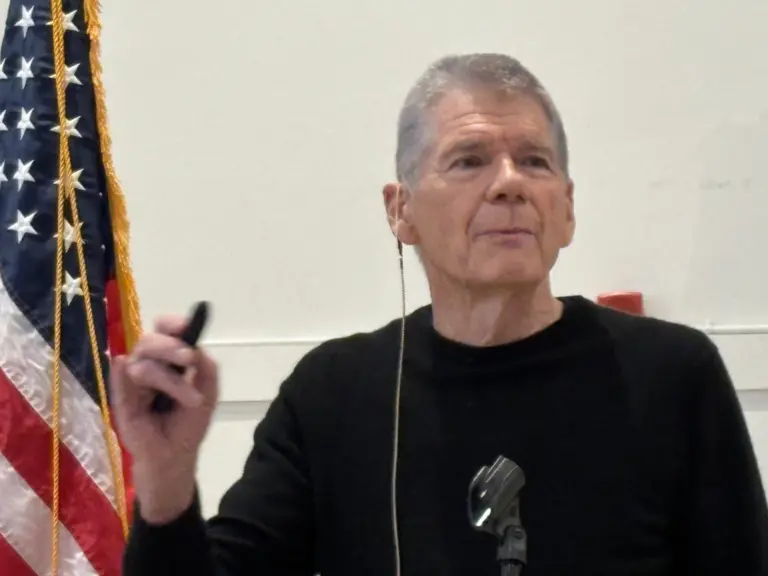By Richard Kaufman
Congressman Jim Himes, a Greenwich Democrat who represents the 4th Congressional District in Connecticut, spoke briefly last week to First Selectman Fred Camillo’s Advisory Committee for People with Disabilities.
The committee’s mission is to serve as a resource to the Greenwich community addressing accessibility, equal rights, removing barriers and promoting opportunities for individuals with disabilities.
Himes discussed the latest on what to expect from the recently passed American Rescue Plan, as well as what to expect from President Joe Biden’s administration and their commitment to serving people with disabilities.
“For the first time, and for arguably for the last time in quite a period of time, there is going to be a major federal infusion of funds into states, counties and towns, including the Town of Greenwich,” Himes said of the latest COVID-19 stimulus package. “The numbers are pretty staggering. It’s up to town leaders and others to make sure in particular the monies that go to the state do find their way down to our towns and our cities.”
Connecticut will receive billions of dollars, and since the state does not have county government, roughly $280 million that otherwise would have gone to counties will go to municipalities. Himes said that current estimates show Greenwich will receive about $21 million from that municipal bucket.
Himes noted that these funds are “fairly broad” in their potential use.
“There are sewer projects, broadband projects, and other things that qualify for use. In combination with the educational money, much of this money will be able to be used either to address issues that arose specifically to the disability community in the last year or so, or to actually improve things like accessibility in our municipal facilities. That’s obviously a decision that will be taken at the local level,” Himes said.
At the federal level, Himes said there wasn’t much to report on about legislation related to Americans with disabilities, because the government has been focused on fighting the pandemic and passing COVID relief money.
But he expressed optimism for the future, citing an Executive Order that Biden signed when he took office, which aims to advance racial equity and support for underserved communities.
“The term equity is defined to include the community of people with disabilities. A lot of those Executive Orders are obviously limited in their scope, but nonetheless it’s a tip of the hand of how this new administration is going to think about the community,” Himes said.
The authorizations on the Workforce Innovation Opportunity Act (WIOA) have expired.
The WIOA was designed to strengthen and improve the nation’s public workforce system and help get Americans, including youth and those with significant barriers to employment, into high-quality jobs and careers and help employers hire and retain skilled workers.
Himes said that hearings on reauthorization could take place in the second half of 2021
Himes expects a “robust conversation” about the interaction of workforce innovation with minimum wage. Recently, there was a major effort to raise the minimum wage which failed on the grounds that it could not be included in a reconciliation. But lawmakers will try to pursue the raise again.
“The question of the employment of those with disabilities and the exemption from some of those employers in terms of paying minimum wage, will be a very hot topic,” Himes said.
Dr. Stephanie Paulmeno, a committee member who works in the Greenwich Health Department and is the President of Connecticut Nurses Association, said the same ideas in the healthcare field should translate into the conversation about minimum wage and people with disabilities.
“In the healthcare field, we look at people not so much as to what they can’t do, but what their abilities are. I think we need to sway the public to not feel that people with a disability should be paid less because they can’t do something, but that their worth is equal to everyone else’s. I’m wondering if there’s some way we can build that in to the laws and discussions around this,” she said.
Committee Chair Alan Gunzburg said training for jobs is the biggest issue.
“We need to be able to deliver good, concise training for jobs. The jobs of yesterday are gone. We don’t have a person bagging our groceries, we’re told to check out and to bag. There’s no mailrooms anymore. We don’t have someone working the slide projector,” he said. “The paradigm needs to be shifted, and the only way to do that is with good training programs that support the individual and gets them into the job world and supports them as they start off.”
There is also currently an effort underway at the federal level around addressing web content accessibility guidelines, and making sure tools like Zoom can be accessible to all. Himes said he expects to see some action on that front in the future. Gunzburg said that there needs to be rules in place about such issues, otherwise progress can get stalled in the courts.
“We’re in the early days of this new administration and new congress, so there’s not a ton of specific things to report,” Himes said. “I feel pretty good about the commitment and the initial actions that have been taken by the Biden administration in terms of making sure we have a truly inclusive society, and that we’re doing the right thing by our communities of disabled Americans.”




